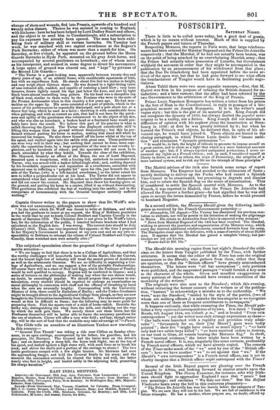The Herald this morning copies from last night's Standard the
criti- cism on the letters from Tangier published by the Times, with further strictures. It seems that the editor of the Tintes has sent the original manuscripts to the Herald; who gathers from them, either that they are spurious, or that the "British officers" have grossly misconducted themselves. The letters were "all but anonymous" ; only portions were published, and the suppressed passages "would furnish a key-note to the character of the whole. Gross and manifest exaggeration in many portions of these letters should have created a conviction of the mendacity of the writers." The originals were also sent to the Standard; which this evening, without retracting the former censure of the writers or of the publica- tion, "hastens" to acknowledge a mistake as to the authorship. "We were," says the Standard, "misled by the style of the parties, (two of whom are military officers ;) a mistake the less singular aF we recognize more than one of them as frequent contributors to newspapers."
It happens curiously, that while censuring the Times, the Herald pub- lishes a very equivocal correspondence of its own. It is dated " Tangier Roads, 6th August 1844, ten o'clock p. m.," and is headed "From OUR correspondent " : yet the writer uses such strange expressions as these- " Our balls were launched with a rapidity and precision truly admi- rable " ; "fortunately for us, their [the Moors'] guns were badly pointed " ; their fire "might have caused us much injury " ; "we have only had two cabin-boys killed "; "we have received orders to destroy, on our road to Oran, all vessels hearing the Morocco flag." In short, from "internal evidence," the letter might have been ,written by a French naval officer. It is, too, singularly like some extracts, professedly by French naval officers, which we have already copied. The censors of the Times make much of the "we" used by one of the "British offi- cers ": here we have another " we" to set against that " we." If the Herald's "own correspondent" is a French naval officer, can it not in charity imagine that a British officer might correspond with the Times?


























 Previous page
Previous page